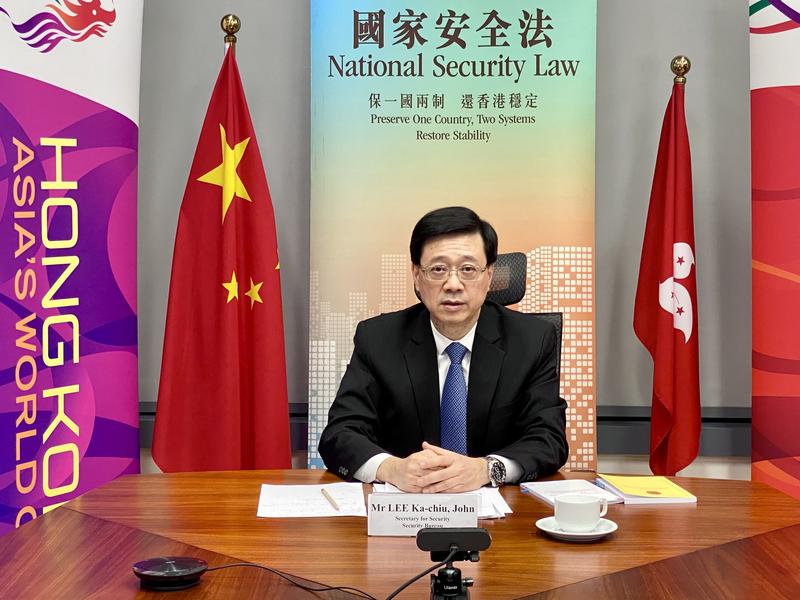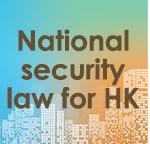 Hong Kong Secretary for Security John Lee Ka-chiu delivers a speech at an online side-meeting on the Hong Kong National Security Law at the 46th session of the United Nations Human Rights Council, March 1, 2021. (PHOTO/HKSAR GOVERNMENT)
Hong Kong Secretary for Security John Lee Ka-chiu delivers a speech at an online side-meeting on the Hong Kong National Security Law at the 46th session of the United Nations Human Rights Council, March 1, 2021. (PHOTO/HKSAR GOVERNMENT)
GENEVA - The National Security Law in Hong Kong has been a stabilizing force for the special administrative region, and stability and order have been restored there, officials said Monday on an online side meeting of the 46th session of the UN Human Rights Council.
After a video clip at the meeting's beginning that shows great strides in Hong Kong since the National Security Law was implemented, John Lee Ka-chiu, secretary for security of the Hong Kong Special Administrative Region (HKSAR) government, told the meeting that the effect of the law is "obvious and direct."
China's five-year plan has offered strong support to shore up HK's status as an international financial, shipping and trade center, and under "one country, two systems," the support of the Chinese central government for Hong Kong is all-rounded and wide-ranging, said HK's security chief John Lee
"Violence has dropped significantly. Stability and order have been restored. People have returned to their normal life. Business has resumed normal. Economy begins to recover," he said, noting that Hong Kong residents have been enjoying more freedom and rights now than before China resumed exercise of sovereignty over the city in 1997.
China's five-year plan has offered strong support to shore up the city's status as an international financial, shipping and trade center, and under "one country, two systems," the support of the Chinese central government for Hong Kong is all-rounded and wide-ranging, he added.
READ MORE: National security law is a 'guardian' for Hong Kong
With order restored and the "one country, two systems" fully ensured, there will be increasing opportunities in Hong Kong, he said.
Martin Liao Cheung-kong, member of the Legislative Council of the HKSAR, stressed that in today's world, almost every country has its own national security law.
The National Security Law in Hong Kong, he said, clearly provides four types of offences that endanger national security, namely secession, subversion, terrorist activities, and collusion with a foreign country or with external elements to endanger national security.
It can be readily seen that the National Security Law in Hong Kong stipulates very elementary requirements for the protection of national security, when compared with the sophisticated national security regimes of some countries in the West, he said.
"Clearly, the NSL (national security law) is a stabilizing force for HK and provides a congenial platform for business and investment for the entire world," he said.
Joephy Chan Wing-yan, community officer of the Hong Kong Federation of Trade Unions, said at the meeting that some Western politicians and media have fully exposed their prejudice and biased double standards.
She explained that in the name of democracy and human rights protection, radical rioters in Hong Kong were responsible for many vicious incidents, but still, these black-clad rioters are glorified in the West.
"If the black-clad rioters were peaceful democracy activists in the eyes of Western journalists and politicians, then by the same standard, those who stormed the US Capitol earlier this year should also be labelled as peaceful democracy activists," she said.
Meanwhile, at the ongoing 46th session of the United Nations Human Rights Council, Henry Ho Kin-chung, delegate of the United Nations Association of China, said Hong Kong people have bid farewell to riot-fueled lies, rumors and the resulting hatred and violence since the enactment of the National Security Law eight months ago
ALSO READ: Poll: Violence subsides in wake of HK National Security Law
Ho, also the chairman of Hong Kong-based One Country Two Systems Youth Forum, said that Hong Kong streets are now much calmer due to the social-distancing measures for fighting COVID-19, but peaceful protests can come back after the pandemic, on issues like housing or social welfare, but not on advocating "Hong Kong independence" or acts endangering national security.
Sponsored by the Permanent Mission of China to UN at Geneva, the side-meeting, titled "National Security Law in Hong Kong: the transition from chaos to rule of law," was attended by diplomats from more than 40 countries as well as officials from the Office of the UN High Commissioner for Human Rights.



